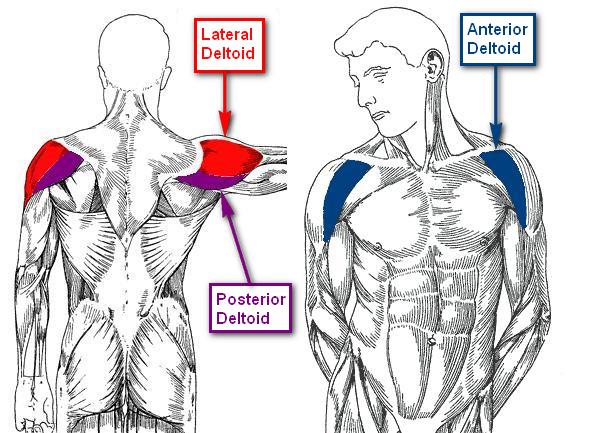Contents
Are you leaving out your rear delts when it comes to shoulder workout? Well, you shouldn’t be if you want to have healthy shoulders for a long time to come.
Well developed rear delts will help to keep your shoulders balanced and help to prevent shoulder injuries and rotator cuff problems.
The under develop posterior deltoid (rear delts) that you’ve been ignoring is actually one of the three heads that make up your shoulder.
Whether your a lifter or not, the rear delt is integral. Why? Because it integrates with other very important muscles, especially the rotator cuff through external rotation at the shoulder. You don’t train just your biceps on arm’s day, do you?
Neglect rear delts can lead to serious shoulder injury. As most people focus on the front and side delts with exercise like the front raise and side lateral raise, forgetting the rear (posterior) delt. Rear delts is crucial for overall healthy shoulder development.
When your front delts become over-developed in comparison to the rear head, for the majority of bodybuilders because of an over emphasis on pressing movements, your shoulder joint ends up rolling forward and out of place and this ends up putting a lot of stress on your rotator cuffs.

Even if you stimulate the rear delts from rowing exercises for your back, but for proper size and strength development you should definitely be including some rear delt isolation workout.
See the full list of workouts below and be sure to check out the demonstration video at the end.
1. Bent Over Lateral Raise
The major shoulder joint muscles involved are the posterior deltoid, and the posterior section of the middle deltoid. The infraspinatus and teres minor are also involved but mainly in the first half of the movement and then act as stabilizers.
This back exercise is a great compound movement, it incorporates the lats, traps, rhomboids, rear delts, even the biceps.
This Face Pull was introduce by Bill Hartman. A fantastic exercise for anyone looking to improve shoulder function, reduce injury and improve posture. A good exercise to strengthen the external rotators of the shoulders.
Same with Barbbell Rows except perform using a dumbbell.
Doing Single Arm bent Over Cable Laterals provides constant tension on the rear delts, unlike the dumbbell that provides only half of the resistance due to the gravity of the weight.
Seated Cable Rows emphasize muscles around the back including the lats, the erector spinae, rear delts, biceps, and forearm flexors.
This exercise mainly contracts the posterior deltoid, infraspinatus, teres minor, and, at the end of the movement as the shoulder blades come together, the trapezius and deeper in the rhomboids.
The Cable Cross Kneeeled requires you to kneel on your knees to emphasize the rear delts when positioned lower than the cable.
This exercise is similar to the Bent Over Lateral Raise except you lay chest down on an incline bench. This isolates the rear delts more and you will not be able to use as much weight as with the standing or seated versions.
Bent over lateral raises is a great shoulder exercise with dumbbells. Highly effective for deltoid and back muscles.
All exercises should be performed in perfect form because bad form or habits that you start now will follow you and will lead to lack of progress or worst off injury in the future. Many if not all the exercises will be new to you.
View Comments